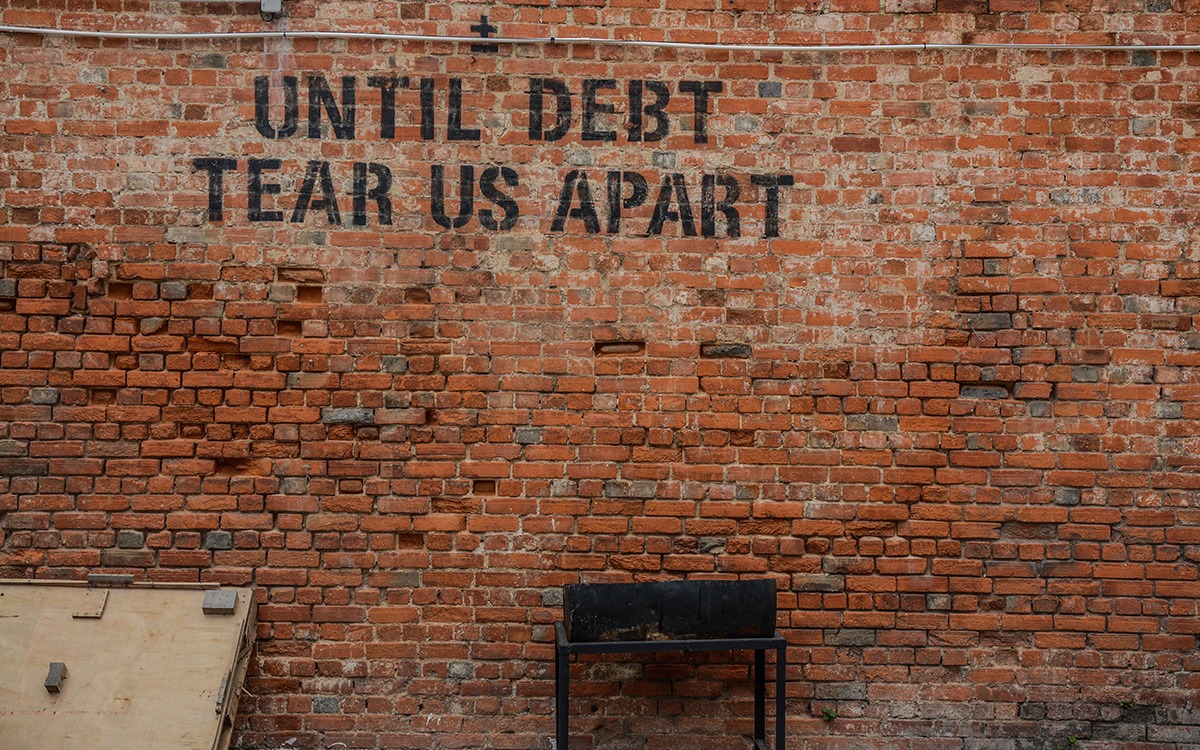
Last August, the Biden administration announced a plan to wipe out student debt for almost half of the 45 million Americans who collectively owe over $1.6 trillion dollars. For the 26 million borrowers who have applied, the program would cancel $10,000 in federal student loan debt and up to $20,000 for those who received need-based Pell Grants. In response, state legislatures are pushing back—with help from right-wing nonprofits.
The states that filed the federal complaint argue that the administration’s plan to offer debt relief and new forgiveness policies under the 2003 HEROES Act is not only illegal executive overreach, but also economically unsound. Conservative think tanks, such as the Cato Institute, the Manhattan Institute, and other nonprofit organizations, have joined in the legal ground game and are spreading the message that debt cancellation is not only bad for the economy in general, but especially for the nonprofit sector. Now, relief for millions of debtors hangs in the balance.
Equity for Whom?
Arguments against student loan forgiveness rest on a dubious idea of “equity.” The complaint filed by states opposing debt relief stresses that canceling student debt would be “economically unwise and downright unfair,” disadvantaging both state entities that depend on federal student loans for profit and Americans who do not hold debt. The opening arguments of the complaint cite the example of a beneficiary who makes a six-figure salary and is planning a honeymoon in Italy—but the facts from the White House show that 90 percent of debt forgiveness will go to borrowers earning less than $75,000 per year.
The Biden-Harris plan to partially cancel student loans is the outcome of years of pressure from progressive organizations such as the Debt Collective, who pushed the president to “pick up the pen” and erase student debt in full. Other advocates—including Massachusetts lawmakers Senator Elizabeth Warren and Representative Ayanna Pressley and nonprofit organizations such as the NAACP and the National Action Network—have called for up to $50,000 or more in debt relief, urging the White House to mitigate racial and economic inequality.
In a press conference held one week before lawsuits against the Biden administration began rolling in, Rep. Pressley pointed out that “Black and brown students have to borrow at much higher rates because of policies in this country that have historically denied our families the chance to build generational wealth.” Sen. Warren has also urged Biden to “close the racial wealth gap, jumpstart our economy, and expand opportunity for millions of Americans.”
Many young voters were persuaded to support Biden during the 2020 presidential election after his promise to “immediately” cancel at least $10,000 in student debt once in office. Almost two years later, his administration’s modified plan would still benefit the 20 million borrowers making less than $125,000 per year—especially federal Pell Grant recipients who are disproportionately Black—by canceling their debt completely. Borrowers would also be able to cap repayment to five percent of their monthly income. President Biden said that the administration hoped to “give working and middle class families breathing room” with these measures.
Who Is Behind Debt Relief Opposition, and Why?
Who is behind the coordinated pushback against student debt cancellation? Although national media attention around debt relief focuses on the state-led lawsuits opposing it, conservative organizations have also played a large role in opposing the policy. Together, this conservative nonprofit ecosystem is fighting against student debt cancellation through lobbying, lawsuits, and other political avenues.
Progressive news outlet More Perfect Union reported that the main case brought to the Supreme Court was advanced by the Job Creators Network, a right-wing donor group advocating for free enterprise and limited government. While the JCN advertises itself as a nonpartisan group advocating for small business interests, the report reveals that the donors behind JCN—such as the Koch brothers—have spent millions of dollars backing conservative, corporate-friendly politicians like Mitch McConnell, Ron DeSantis, and Donald Trump—to benefit from their corporate-friendly policies. JCN donors also own right-wing media outlets such as Breitbart News and Turning Point USA, who call student loan relief “questionable” and “an attempt for the American taxpayer to subsidize leftists’ poor choices.”
Organizations belonging to The National Civil Liberties Alliance—a group of nonprofits whose mission is to “protect constitutional freedoms from violations by the Administrative State”—such as the Cato Institute, the Manhattan Institute, and others filed an amicus brief supporting the two lawsuits against student debt that have now reached the Supreme Court.
Sign up for our free newsletters
Subscribe to NPQ's newsletters to have our top stories delivered directly to your inbox.
By signing up, you agree to our privacy policy and terms of use, and to receive messages from NPQ and our partners.
The Cato Institute, a think tank founded by Charles Koch, argued in their federal lawsuit that student debt relief would negatively impact the nonprofit sector in particular. The brief reads that nonprofit organizations need the incentive of the Public Service Loan Forgiveness program. Created in 2007, the PSLF promised to pay outstanding balances on federal loans for borrowers who worked full-time in qualifying government and nonprofit positions for 10 years and made 120 payments. With this incentive, the Cato Institute argues, nonprofits enjoy a “materially improved position,” recruiting people who need to pay off their loans even though they offer pay that is comparably lower than their for-profit counterparts.
But while the PSLF may be an incentive for nonprofit employers, it has hardly worked out well for nonprofit employees. In 2018, NPR reported that a staggering 99 percent of applications for loan forgiveness had been denied. In many of these cases, borrowers were told by loan servicers several years into the repayment process that they did not meet program requirements.
The nonprofit sector cannot, in other words, recruit anyone on the strength or efficiency of PSLF. Nonprofit organizations banking on the federal government’s loan forgiveness program to make their pay competitive with private sector companies can neither offer salaries competitive enough to pay off insurmountable debts, nor force their employees to depend on a government program that is designed to fail debtors. These various strategies of disinformation around student debt are tactics to deliberately justify its resulting injustices; as Brynn Tannehill documented in Dame last fall, student debt is a tool that very effectively reinforces the nation’s existing enormous racial wealth gap. But debt justice organizations like the Debt Collective have provided clear, consistent information over the past two years about why student debt cancellation is racially just, economically sound, and governmentally possible.
Who Benefits from Economic Crisis?
The case against student debt relief, advanced by conservative nonprofits in the name of the nonprofit sector, is a bad-faith attempt to keep millions of people in debt—because student debt limits people’s options.
Student loan payments continue to be paused until the Supreme Court decides, at the end of this month, whether the Department of Education can carry out the debt relief program. If the Supreme Court overrules the plan, payments will resume—and experts anticipate a massive wave of student loan defaults. As the Debt Collective’s Eleni Schirmer writes, inflation and cost of living increases have already caused people to fall behind on payments for credit cards and car leases. If the student loan payments resume, more debtors will default on those loans, too: “Suddenly, borrowers’ entire balance becomes due, no longer eligible for repayment plans or deferment. Their wages may be seized, tax refunds can be withheld, and even Social Security payments could be garnished.” The decision from the Supreme Court is expected by the end of this month.
The case against student debt relief, advanced by conservative nonprofits in the name of the nonprofit sector, is a bad-faith attempt to keep millions of people in debt—because student debt limits people’s options. In the larger economic picture, many employers have been hoping that a recession will trigger mass unemployment, reigning in higher wages and increased worker power of the past few years. Like unemployment, student debt is a type of economic distress that business leaders depend on to discipline workforces.
Canceling student debt will not fix the debt-reliant systems that brought us to this trillion-dollar balance. But by doing so, 45 million borrowers will take a small step towards economic freedom.












